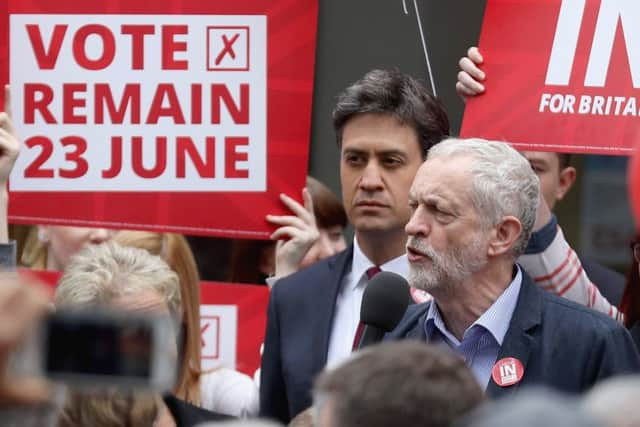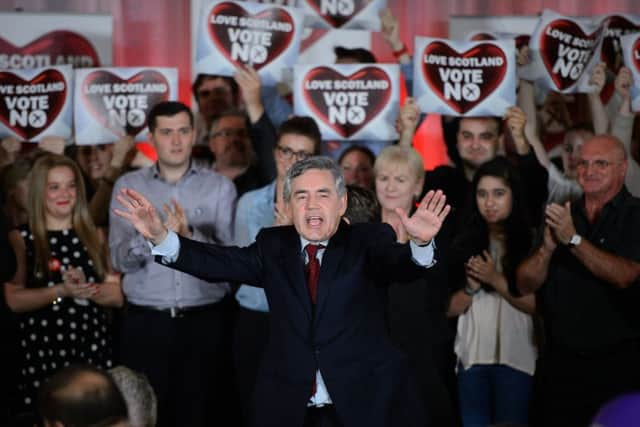Gordon Brown: Why we must stay in the vanguard of Europe


In the first half of 2014, I was completing a book that put my case for Scotland staying part of Britain. In advance of the Scottish independence referendum of September 2014, I wanted to present my own patriotic view of what Scotland’s future could be.
I wanted to show that the needs and aspirations of the Scottish people could best be advanced as part of a reformed United Kingdom and that there was no contradiction between being a patriotic Scot and a supporter of the Union.
Advertisement
Hide AdAdvertisement
Hide AdTo show my patriotic credentials, it made sense to start from my own Scottish background. I could trace my family’s roots back 300 and more years within Scotland and indeed within one county of Scotland, the Kingdom of Fife – and trace how, from a farming background rooted in the land of Fife, our family fared from the time of the Union in 1707.


My bloodline could be tracked back through both my father and mother. I was Scottish born-and-bred and from a Scottish family that could be traced back as far as records of birth, marriages and deaths were available – to the early 1700s, three centuries and nearly 15 generations ago.
Just after I sent off my book on Scotland to my publishers, I found myself talking to my friend, the author Alistair Moffat, who also ran a company that analysed DNA through a very simple saliva test that he had perfected. And so to complete my work into the family tree I decided to take a saliva test and waited for the results.
To my astonishment everything that I assumed was now questioned by the findings: through the DNA test they could trace back my roots far beyond Scotland – and they did not, indeed, start in Scotland at all. I was neither part of the Pictish race, nor the original Scots, nor the Angles, nor the Gaels. My family’s roots, the research suggested, lay in Scandinavia – not in Norway, from where many of today’s Scottish families’ bloodlines can be traced, but in Sweden.
Almost certainly, my ancestors had travelled by sea from Sweden to England in search of prosperity and the evidence suggests they left Sweden around the 9th or 10th centuries. And from there we were able to piece together, through family stories handed down over the years and by a process of deduction, a picture of immigrants who, having arrived on the North Sea coast of England, moved northwards within England to the Border country between Scotland and England.


Like many in their time they had probably been Border reivers – and lived a difficult and violent life on that fraught border in the 15th, 16th and possibly right up to the early 17th centuries before moving north. And so the early story of my family’s roots started to come together. My older brother remembered that my father had told him of our Border roots and that our ancestors had indeed spent time working in the hills and valleys between Scotland and England. Indeed, he had told him a family story passed down through the generations that our ancestors were forced to flee the Borders – and that Brown was not our original name. To escape from our pursuers, we had to change our name.
What started off as a search for an identity that appeared to be purely Scottish in origin ended up as a discovery of my migrant roots – indeed an understanding that almost all of our families, at some stage, have been migrants – and my European roots: Scandinavian ancestry, an English journey and time on the borderlands between two countries before becoming the Fife family we have been for 300 years.
And so it is with most families in Britain. As Norman Davies recalls in The Isles, the DNA of the oldest British skeleton was analysed and found to have continental roots, leading him to suggest we were all Europeans then and we are all – to a large extent – Europeans now.
Advertisement
Hide AdAdvertisement
Hide AdSo those who write off our European heritage are, at least in part, writing off their own heritage. But I have not founded my case for remaining part of the European Union on genealogy: my case is based on what Europe can yield for us in the future. And I have tried to make a positive, principled and patriotic case for Britain’s membership of the European Union.


Of course the risks from leaving the European Union cannot be left unstated, including the fall-out from unintended consequences. One possible outcome of a Leave vote is a second Scottish referendum on independence. And, if England was to be permanently outside the European Union the pressure would be on Scotland to adopt the euro rather than the pound. We should counterpose this with a vision of a European Union ready to champion more direct participation by the regions and the nations.
The Northern Ireland DUP leadership is calling for a Leave vote – which, if successful, would reintroduce border controls and custom points and destabilise the Good Friday agreement. Sinn Fein have retaliated with a call for a border poll to end partition. To this, we should counterpose a positive vision in which Europe mobilises its economic resources to strengthen cross-border co-operation and narrow long-standing inequalities within Ireland.
We have a duty also to inspire people about the opportunities arising from Europe by focusing on the positives where the EU can help improve standards of living and quality of life in the future.
Before 23 June, 2016, voters should hear more not just about the positive benefits that European membership brings to Britain today but what it can bring to Britain in the future. And a forward-looking agenda might highlight five ways Europe can do better by the British people.


1Focus on the half a million new British jobs that can be created in the next ten years from reforms to the Single Market – opening up the digital economy (which can contribute 25 per cent of increased output), the energy market (15 per cent), and the service and other sectors, including financial services and capital markets (just under 60 per cent), through offering economies of scale, lower production, transaction and distribution costs and easier access to finance.
2European help for hard-pressed industrial communities hit by closures and restructuring. At the same time as we seek a future for steel manufacturing in Britain, additional new jobs can come from the European infrastructure initiative by insisting Britain benefits now from a 15–16 per cent share of the €315 billion European Investment Plan – and this should be in addition to substantial Social Fund and other support for our steel communities.
3Act together to create a fairer society. We have shown that European co-operation can lead global efforts to reduce tax avoidance and tax evasion by forcing the exchange of information between national tax authorities. Faced with the loss of €1 trillion in tax receipts to fund public services, a European initiative – pushed through the G20 and the Organisation of Economic Co-operation and Development – can lead the way. There should be no hiding place for tax evaders and no safe haven for tax avoiders.
Advertisement
Hide AdAdvertisement
Hide Ad4Reduce the pressures from migration in the areas which worry fellow citizens most – the NHS, schools, and social housing. Our most affected communities should be benefiting from a new European Solidarity Fund built out of Europe’s current Asylum Migration and Integration Fund, (from which the UK is to receive €370m by 2020), a far more comprehensive version of the UK Controlling Migration Fund which can provide extra support for local areas that face unexpected pressures. And we should extend co-operation among security, intelligence and policing authorities across Europe to tackle the criminal mafias, the people smugglers and the gangmasters who exploit migrants and increase unlawful immigration from the Middle East and Africa. While helping refugees who need our support, we need to back up our own system of border controls with a better European co-ordination of security forces.
5Build a European strategy for addressing the root causes of Middle Eastern and African instability. While most of our terrorist threats come from home-grown terrorists – and reforms in security co-operation among security services will help reduce this – the roots of terrorism lie outside Europe. And if we are to thwart terrorism, slow the flow of migrants from the Middle East and Africa and do something to answer the more basic problem – grievances of millions of young people in the Middle East and Africa who are being taught the only alternatives are tyranny and terrorism – we will need a comprehensive Middle East and Africa strategy as bold as the 1940s Marshall Plan. This cannot be delivered by Nato which is a defence and military alliance unable to undertake the comprehensive “out-of-area” effort that requires the use of aid, economic muscle and soft power. And while America shares our interests in these regions, it is looking at the Middle East from a long-term perspective. For Europe, migration and terrorism are immediate and urgent problems on our own doorstep that have to be addressed. The European-led Marshall-style Plan, which is needed urgently, would use all our weapons – military, diplomatic, financial and economic – to help build stability and prosperity in these regions.
All these immediate challenges – from terrorism to job creation and other longer-term challenges from pollution to dealing with Russian aggression – show how, at every turn, it is important, in our national interest, to get the balance right between the autonomy we desire and the co-operation we need.
And we can only succeed in meeting and mastering these challenges by leading in Europe. Not being “half-out”, as we currently appear to many; not being “fully out”, where the Eurosceptics would want us to be, but by pushing our way to Europe’s centre where and when it matters. That’s how we can be in the vanguard, advancing British interests by shaping Europe and through our influence in Europe shaping the world. And this is how, on reflection, the British people appear to see it. By two to one – 41 per cent to 21 per cent among those who expressed an opinion – citizens agreed with the Hate not Hope opinion poll statement that “Britain does best when it is a leading country within the European Union”.
In the spirit of a country that defeated fascism on the continent of Europe it is simply not British to be on Europe’s sidelines especially when we are in an insecure and unstable world which faces the same challenges as us. It is certainly not the Britain I know best to relegate ourselves to the periphery when big security decisions that affect our safety as citizens have to be made not only in Nato but in the European Union.
Only 70 years ago Britain’s power lay in directing an Empire we imagined would last forever. So we downplayed our role in Europe even when we were in a position to be its leader. We took time to understand that there was a new world in the making. Now, as the world’s economy has gone global, our era is marked out by the interdependence and interconnectedness of the world’s peoples. And Britain, the most outward-looking, internationalist and globally connected power in Europe, is in a position to help lead Europe into this new world. We should seize the opportunity.
Being that leader will allow us once again to display the qualities that made Britain’s worldwide reputation for championing democracy and fair play. These are the values we showed when we led the fight against fascism, and then helped rebuild Europe from the ruins of war. The same values we showed when we stood up to dictators in Eastern Europe, helped restore peace on the edge of Europe in the Balkans and fought anti-Semitism.
These are the same values that we showed when we worked to establish the European Convention of Human Rights, defended democracy, resettled refugees and stood in solidarity with those fleeing persecution.
Advertisement
Hide AdAdvertisement
Hide AdThey are the values upon which Britain helped build European co-operation in what had been a war-torn and divided continent. These were the values we showed when we invited the countries of Eastern Europe in as the Cold War ended and when we offer the hand of friendship – irrespective of race or religion – to all those who embrace democracy, liberty and equality of opportunity. This is the Britain I know and love – the Britain that should be leading Europe not leaving it. For “Brex-it” read “Lead-it”.